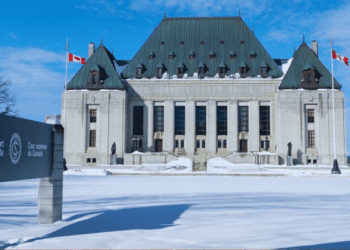Writing in the National Post, MLI Senior Fellow and lawyer Benjamin Perrin calls on leaders of the civilized world to pressure China into respecting the rights of its citizens. As the country reaches the 25th anniversary of the Tiananmen Square Massacre, Perrin says it’s more important than ever to condemn China’s abuses when it comes to issues such as wrongful imprisonment and religious persecution.
The Post ran an edited version of this column.
Benjamin Perrin, June 4, 2014
This week commemorates the 25th anniversary of the Tiananmen Square massacre. China has been on my mind a lot lately and not just because of this somber anniversary. A crack-down on pro-democracy protesters then is being repeated with an apparent crack-down on religious adherents today.
What little news manages to slip out of China about religious persecution is deeply disturbing. Bob Fu’s captivating autobiography, God’s Double Agent, reveals in harrowing detail the intimidation, threats, mistreatment, and imprisonment that awaits those who have dared in recent years to attempt to practice their faith. Fu was granted asylum in the U.S. and runs a group called ChinaAid, which has done much to raise awareness about systematic suppression of religion in China.
Unfortunately, religious persecution by Communist China has a long history. As Fu writes at the outset of his book, Chairman Mao’s wife once said: “Christianity in China has been confined to the history section of the museum. It is dead and buried.” The vigor with which this failed policy of religious cleansing has been pursued is remarkable, and is continuing despite estimates that there are hundreds of millions of people of various faiths in China today.
In March, Father Raymond J. de Souza wrote about China’s Catholic bishop having died after spending 50 years in a Chinese gulag and under house arrest. In April and again in May, The National Post reported on two separate incidents where churches have been slated for demolition by Chinese authorities. In the latter case, congregants were told by government officials that their cross was too big – the irony of that statement is palpable. When the cross stayed up, the demolition crews came in with the ridiculous cover-story that this modern church didn’t meet building codes.
Christians are, of course, not the only persecuted minority in China. Many others have suffered similar threats, intimidation, mistreatment, imprisonment, and, in some cases, torture. Some brave lawyers in China have taken up their cause. One of the most prominent has been Mr. Gao Zhisheng.
In 2005, Gao Zhisheng, a respected Chinese human rights lawyer and Nobel Prize nominee, had his legal practice suspended after representing one too many Christians and Falun Gong practitioners. Since then, he has been imprisoned, tortured, and now disappeared in the Chinese prison system. His only apparent crime has been representing his clients and speaking out against their repression.
The Law Society of Upper Canada has recently called for action in Gao Zhisheng’s case and asked its members to similarly intervene. China needs to immediately release Gao Zhisheng into the care of his family and end its persecution and mistreatment of him once and for all. He should be allowed, if he chooses, to resume his legal practice and represent his clients and advocate for them. He has an international team of pro bono lawyers advocating for him at the United Nations Committee on Enforced Disappearances.
According to United Nations experts, cases like Gao Zhisheng’s are part of a “wave of enforced disappearances” in China. In 2011, they reported that “persons subject to enforced disappearances appear to be human rights activists, lawyers and students. These enforced disappearances represent the continuation of a disturbing trend in the suppression of dissidents”.
In addition to undermining fundamental international human rights, cases like Gao Zhisheng’s raise troubling questions about the state of the rule of law in China. If a lawyer can have his practice shut down, then imprisoned and tortured for the “crime” of representing his clients, what confidence can we have in China’s legal system? If a lawyer representing a religious adherent can be punished one day for acting for their client, what is to stop lawyers who represent Canadian or American companies in China from suffering a similar fate tomorrow? If lawyers cannot vigorously represent their clients, we don’t have the rule of law. We have something riskier and more troubling.
As China marks the 25th anniversary of the Tiananmen Square massacre, it needs to know that the rest of the world hasn’t forgotten, and won’t accept its ongoing efforts to suppress the basic freedoms of its people. It should do the right thing and release Gao Zhisheng and others like him. Meaningful steps to open China up to information and ideas and respect basic human rights need to happen. There was a time when we insisted on it. We should do so again.
Benjamin Perrin is a law professor at the University of British Columbia and senior fellow at the Macdonald-Laurier Institute for Public Policy. He is a member of the Law Society of Upper Canada and Law Society of British Columbia, and has written to the Chinese Government calling for the immediate release of human rights lawyer Gao Zhisheng.





